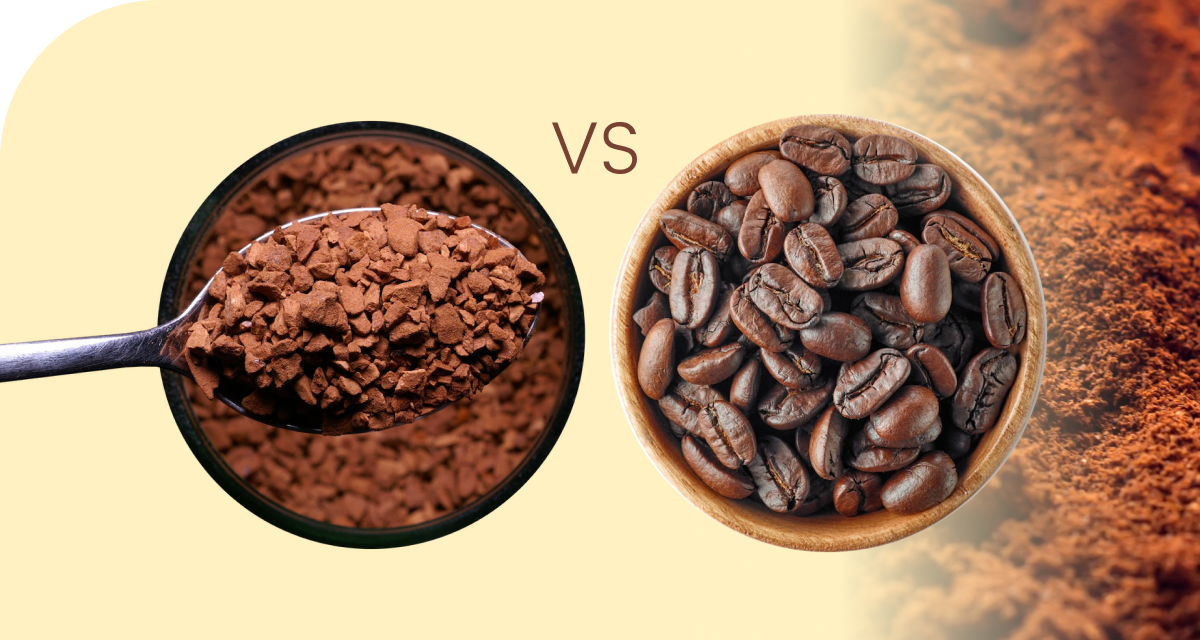Instant Coffee vs Ground Coffee: What You Need to Know
Coffee enthusiasts and industry leaders alike are well-versed in the diverse ways coffee can be enjoyed. But in recent years, the demand for fast, high-quality coffee options has surged, driving new coffee trends in the food and beverage market.
According to a report by Circana, global coffee servings have increased by 5% year-over-year, with notable growth observed in 11 out of 12 monitored countries, including the United States, Canada, and China.
The debate over instant coffee vs ground coffee sparks lively discussions among aficionados and casual drinkers alike.
Understanding the nuances between instant coffee trends and the enduring appeal of ground coffee offers insights into how the industry continues to adapt and innovate.
The global coffee market was valued at approximately $132.1 billion in 2024, with expectations to reach $166.4 billion by 2029, growing at a CAGR of roughly 4.72%.
Let’s dive into what sets these two popular coffee forms apart, their distinct qualities, and why they continue to shape the landscape of modern coffee consumption.
What is instant coffee?

Instant coffee is a fast and convenient coffee option, made by brewing coffee beans and then drying the extract into a powder or granules.
This process captures the coffee’s flavor compounds before freeze- or spray-drying, allowing you to make a cup just by adding hot water or milk. It’s perfect for those seeking a quick and easy coffee experience without sacrificing taste.
Most instant coffee uses Robusta beans, which are known for their strong, slightly bitter taste, and higher caffeine content.
While instant coffee may lack the depth of freshly brewed varieties, it provides a dependable flavor profile with minimal effort.
What is ground coffee?
Ground coffee offers a traditional approach, made from roasted beans ground to a specific texture based on the brewing method.
Common brewing techniques include French press, drip coffee, and espresso, each of which requires specific grind sizes for optimal flavor extraction.
With ground coffee, Arabica beans are often used for their nuanced flavors, which can range from floral to fruity or even chocolatey, depending on the roast.
Since ground coffee does not dissolve in water like instant coffee, it requires brewing equipment to extract flavors fully.
This method captures the essential oils and complex aromas, resulting in a richer and more robust coffee experience than instant coffee can provide.
Differences between instant coffee and ground coffee
| Feature | Instant Coffee | Ground Coffee |
| Preparation | Just add hot water or milk | Requires brewing process |
| Flavor Profile | Generally uniform and often more bitter | Richer and more complex flavors |
| Caffeine Content | Typically lower than brewed coffee | Usually higher caffeine content |
| Waste | No waste; all soluble | Leaves behind used grounds |
| Shelf Life | Long shelf life; stable | Shorter shelf life; may go stale |
| Convenience | Very convenient; quick to prepare | Requires equipment and time |
The main difference between instant coffee vs ground coffee really lies in the preparation method and the resulting flavor profile.
Instant coffee is pre-brewed and dehydrated, while ground coffee requires brewing to extract flavors.
Trends in instant and ground coffee
Consumer preferences are continually evolving, shaping distinct coffee trends for instant and ground varieties. Here are some notable trends:
Premium instant coffee
The perception of instant coffee has transformed significantly in recent years. Brands are now producing premium instant coffee using high-quality beans and improved dehydration techniques. This results in a richer, more authentic flavor closer to that of ground coffee.
Sustainable practices
Coffee consumers are increasingly aware of environmental impacts, driving demand for sustainable sourcing and eco-friendly packaging.
Ground coffee brands, in particular, are incorporating these practices, often offering organic and fair-trade options.
Single-origin and specialty options
For ground coffee, the trend towards single-origin beans and unique roast profiles has become a selling point.
Specialty roasters highlight specific regions—such as Ethiopia, Colombia, and Sumatra—catering to consumers seeking a distinct coffee experience with complex flavors.
Functional instant coffee
In line with the health and wellness trend, brands have introduced functional instant coffee, which incorporates ingredients like collagen, adaptogens, and antioxidants.
This trend appeals to health-conscious consumers who want added benefits with their morning coffee.
Hawaij coffee
Middle Eastern flavors are increasingly popular, and Hawaij—a traditional Yemeni spice blend of cardamom, cinnamon, ginger, and cloves—adds a warm, aromatic twist to coffee.
This blend taps into consumer interest in global flavors and wellness, thanks to its antioxidant-rich ingredients.
Why does ground coffee taste better than instant?
Ground coffee usually tastes better than instant coffee, and that’s all about the quality and freshness of the beans.
It’s made from whole beans that are freshly roasted and ground, while instant coffee is just dehydrated, processed granules.
Plus, with ground coffee, you get more control over how you brew it, using cool methods like a French press or pour-over, which gives you a richer and more flavorful cup.
On the flip side, instant coffee has limited brewing options and can lack that depth of flavor.
Also, ground coffee tends to pack more caffeine because it uses a more concentrated amount of beans per serving. At the end of the day, coffee taste is super subjective and really comes down to what you like.
However, many coffee fans believe that ground coffee offers a more authentic and tasty experience compared to instant. So, choosing between the two is all about personal preference and convenience!
Is instant coffee as healthy as ground coffee?
Contrary to popular belief, instant coffee, and ground coffee have similar nutritional profiles. Both types of coffee contain antioxidants and caffeine, but the processing methods used for instant coffee may lead to a slight decrease in certain beneficial compounds.
However, this difference is minimal and does not significantly impact the health benefits of both types of coffee.
Additionally, instant coffee can be a more convenient option for those who are short on time or don’t have access to brewing equipment.
It also has a longer shelf life compared to ground coffee, making it a practical choice for those who do not consume large amounts of coffee regularly.
So Which is better?
Ultimately, which form of coffee is better depends on personal preference.
Ground coffee offers a fresher, richer taste but requires more preparation and equipment.
Instant coffee provides convenience and a quick caffeine boost, but may not have the same depth of flavor as freshly brewed ground coffee.
However, with advancements in technology and growing demand for quality instant options, it’s likely we’ll see even more innovative developments in the world of instant coffee.
So whether you prefer the ritual of grinding your own beans or the ease of dissolving a spoonful of instant powder into hot water, there’s no denying that both forms have their place in the ever-evolving world of coffee consumption.
How Tastewise empowers brands to stand out in a saturated coffee market
Given the crowded coffee market, standing out requires more than just great beans—it demands unique, AI-driven insights into consumer preferences, emerging trends, and purchasing behaviors.
Tastewise helps coffee brands pinpoint what matters most to their audiences, from trending flavors and functional ingredients to sustainable practices that resonate with today’s conscious consumers.
Using advanced AI analytics, Tastewise can identify and forecast coffee trends in real time, offering a deep understanding of flavor preferences, health-focused choices, and evolving demands like plant-based or functional ingredients.
Brands can rapidly leverage these insights to innovate products, tailor marketing messages, and engage with consumers on a personal level.




